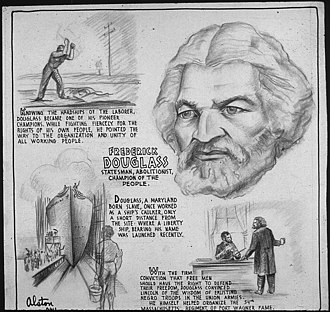African American founding fathers of the United States
However, after Reconstruction ended in 1877, the gains were partly lost and an era of Jim Crow gave blacks reduced social, economic and political status.
The recovery was achieved in the Civil Rights Movement, especially in the 1950s and 1960s, under the leadership of blacks, such as Martin Luther King and James Bevel, as well as whites that included Supreme Court justices and Presidents.
President Andrew Johnson, who sought easy terms for reunions with ex-rebels, was virtually powerless; he escaped by one vote removal through impeachment.
New Republican governments came to power based on a coalition of Freedmen together with Carpetbaggers (new arrivals from the North), and Scalawags (native white Southerners).
In response to Radical Reconstruction, the Ku Klux Klan (KKK) emerged in 1867 as a white-supremacist organization opposed to black civil rights and Republican rule.
According to Professors Jeffrey K. Tulis and Nicole Mellow:[11] The Founding, Reconstruction (often called “the second founding”), and the New Deal are typically heralded as the most significant turning points in the country’s history, with many observers seeing each of these as political triumphs through which the United States has come to more closely realize its liberal ideals of liberty and equality.Scholars such as Eric Foner have recently expanded the theme into full-length books.
[15] Constitutional provision for racial equality for free blacks was enacted by a Congress led by Thaddeus Stevens, Charles Sumner and Lyman Trumbull.
In a deep reaction called the Nadir of American race relations, after 1876 freedmen lost many of these rights and had second class citizenship in the era of lynching and Jim Crow laws.
Under the public leadership of Martin Luther King, president of the Southern Christian Leadership Council, and the strategies of SCLC's Director of Direct Action, James Bevel, the nonviolent Civil Rights movement made the nation aware of the crisis, and under President Lyndon Johnson major civil rights legislation was passed in 1964, 1965, and 1968.
[19] The Liberator (1831–1865) was the hard-hitting highly influential abolitionist newspaper run by William Lloyd Garrison, a white man based in Boston.
While NAACP is a membership organization with chapters across the country, LDF is a law firm in New York City that focuses on civil rights lawsuits.
He persuaded William Lloyd Garrison to adopt an anti-colonization position and helped fund his newspaper The Liberator (1831–1865), frequently publishing letters on public issues.
[31] According to biographer David Blight, Douglass, (1817–1895), "played a pivotal role in America's Second Founding out of the apocalypse of the Civil War, and he very much wished to see himself as a founder and a defender of the Second American Republic.
[33] In 1863 during the American Civil War, Turner (1834–1915) was appointed by the US Army as the first African-American chaplain in the United States Colored Troops.
Wells dedicated her lifetime to combating prejudice and violence, the fight for African-American equality, especially that of women, and became the most famous Black woman in the United States of her time.
He rose to national prominence as a leader of the Niagara Movement, a group of African-American activists who wanted equal rights for blacks.
Instead, Du Bois insisted on full civil rights and increased political representation, which he believed would be brought about by the African-American intellectual elite.
He referred to this group as the Talented Tenth, a concept under the umbrella of racial uplift, and believed that African Americans needed the chances for advanced education to develop its leadership.
Racism was the main target of Du Bois's polemics, and he strongly protested against lynching, Jim Crow laws, and discrimination in education and employment.


